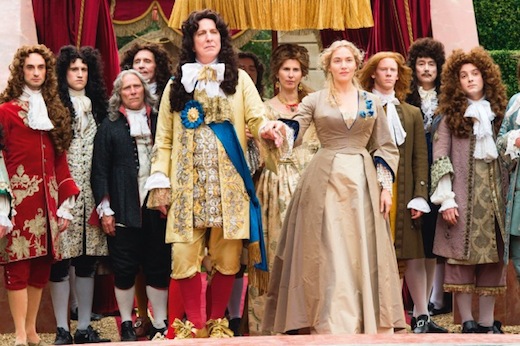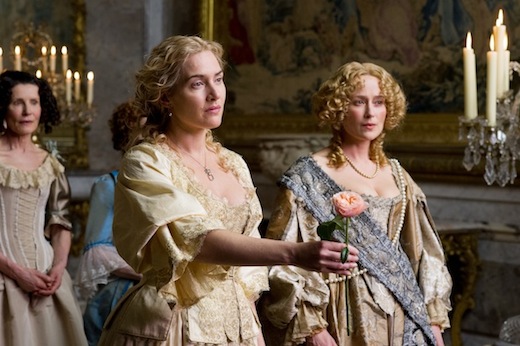A Little Chaos is a period drama directed by Alan Rickman and starring Kate Winslet as a woman charged to design and build a grand fountain garden for Louis XIV at Versailles. The film is, I noted from the poster, ‘the official film of RHS Gardening Week’, which may or may not be a hotly contested title, I just don’t know. All I can tell you is that it is, in fact, more of a love story than a horticultural story, and while it has occasional pleasing moments, and is lavishly costumed, it manages to do what I do whenever I try my hand at gardening. That is, despite my best intentions, and slogging my guts out, I somehow kill everything stone dead.
It opens with the King’s landscape architect, André Le Nôtre (Matthias Schoenaerts) interviewing candidates to take on the fountain garden. Sabine De Barra (Winslet) is one such candidate, whom he first sees from his window, approaching the house, pausing by a circle of topiarised Buxus balls (is that what they’re called?), and pushing one pot slightly out of line. This, we understand, is the film setting out its stall. Here is a man who likes order and control. Here is a woman who is going to disturb that order, and bring ‘A Little Chaos’, and meddle with his balls, which he will not like, but then will like, which is the way these things tend to go at the movies.

He interviews her, studies her plans, questions her plans — ‘Are you a believer of order over landscape?’ — then dismisses her. She’s flunked it, she thinks. On her exit she throws her hat to the ground. But then he re-appraises her work, visits her at home, and falls for her garden, which is small but lush and also moist, with a tinkling water feature. How can he resist? She’s hired.
So the two are drawn to each other, but there are obstacles. He is married, albeit unhappily, to a wife (Helen McCrory) who is ambitious and evil. We know she is evil because, unlike Sabine, who wears white, she wears black and dark plum, like every wicked stepmother in every Disney cartoon, and also Joan Collins in panto. Sabine, meanwhile, keeps reliving a past trauma via flashbacks. A husband, a child, a horse-and-carriage accident. Can she recover? But there is comedy too, as provided by Stanley Tucci as the King’s camp, bisexual brother — a role Tucci could do in his sleep, and probably did, but it’s still fun — while Rickman himself plays Louis XIV.
Rickman plays Louis XIV as Rickman would play Louis XIV: that is, with a certain drollness and with half an eyebrow always half raised, but he does bring some human-ity to the role, so I’m not going to bleat about that. The most successful scene by far occurs when Sabine mistakes the King for a fellow gardener who has written a book on pears. ‘A book on pears?’ queries the King, drolly, with half an eyebrow half raised. I was tickled by that; less so with the rest of the script. André, Sabine announces at one point, ‘is the most complete person I know’. Seriously? Someone would say that? In 1682?
Also, not true. No character is complete in this, as no character has been fully realised. Schoenaerts as Le Nôtre is hot, simply by virtue of Schoenaerts being hot, but as a character he is so low-energy it’s as if he’s just gloomily depressed and, as there is nothing else to him, he is fantastically dreary. (I still would, obviously, but might not hang around.)

And the pacing is dreary, too. Ms Winslet emotes her little socks off, and it is never a waste of time watching Ms Winslet emote her little socks off, but she cannot triumph over such dreariness, particularly as the plot takes all manner of dramatically irrelevant turns: Sabine being introduced to high society; Sabine suffering a variety of setbacks so it can be brought home, once again, how hard it was for women back then. Most critically, though, this is a film that set out its stall and then forgot it had done so. It wants us to believe Sabine is that free spirit, but provides no real evidence that this is the case. Indeed, her grand fountain garden isn’t even a garden. It’s more a precise feat of engineering, so go figure that one out. In fact, neither André or Sabine take any journey whatsoever, but we’re still meant to buy that they have.
Like I said, this film has its pleasing moments, and is beautiful to look at, with more over-the-top wigs than you can shake a stick at, should you wish to shake a stick at over-the-top wigs, and I do love a 17th-century fop in buckled shoes. But the characters do not connect to each other and we therefore cannot connect with it. ‘Book of pears?’ Still tickled by that, at least.
Got something to add? Join the discussion and comment below.
Get 10 issues for just $10
Subscribe to The Spectator Australia today for the next 10 magazine issues, plus full online access, for just $10.
You might disagree with half of it, but you’ll enjoy reading all of it. Try your first month for free, then just $2 a week for the remainder of your first year.













Comments
Don't miss out
Join the conversation with other Spectator Australia readers. Subscribe to leave a comment.
SUBSCRIBEAlready a subscriber? Log in